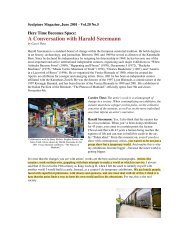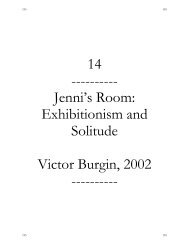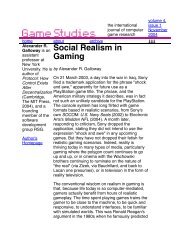Untitled
Untitled
Untitled
Create successful ePaper yourself
Turn your PDF publications into a flip-book with our unique Google optimized e-Paper software.
Europe and Its Others<br />
like to define European cultural identity by means of such values or analogous<br />
ones: Namely, these values are too general, too universal, to define a specific<br />
cultural identity and to differentiate it from other cultures. On the other<br />
hand, the catalog of these values is too meager to do justice to the immense<br />
wealth of the European cultural tradition. The discourse on European cultural<br />
identity has been circulating this paradox for decades now. On the one hand,<br />
this circulation evokes the feeling of an enormous intellectual dynamic, but<br />
on the other the corresponding discourse remains in the same spot the whole<br />
time. The project of defining the particular cultural identity of Europe by<br />
appealing to universalistic, humanistic values cannot succeed, if only because<br />
it is incoherent on the level of simple logic.<br />
Every logically coherent definition of a cultural identity presumes that<br />
other cultures are different but of equal value. If, however, the particular<br />
European values are defined as universal humanistic values, that can only<br />
mean that other non-European cultures must be considered antihumanistic<br />
by nature, that is, as inherently inhuman, antidemocratic, intolerant, and so<br />
on. In view of this diagnosis, it is clear that the European cultural and political<br />
sensibility is necessarily ambiguous. To the extent that human rights and<br />
democracy can be recognized as universal values, Europeans, as champions of<br />
such values, feel morally obliged to push them through worldwide. In the<br />
process they find themselves, quite rightly, confronted with the accusation<br />
that they are pursuing an old European policy of imperialist expansion under<br />
the guise of defending and championing human rights. To the extent,<br />
however, that human rights can be recognized as particularly European values,<br />
Europeans feel obliged to protect themselves within Europe, that is, to isolate<br />
the European cultural sphere and defend it against the antihumanistic aliens.<br />
Hence European politics oscillates between imperialism and isolationism—<br />
mirroring the particular–universal character of the values that it wants to<br />
assert as its own.<br />
Quite clearly such a particular–universal definition of European culture<br />
places other cultures under immense pressure to justify themselves. Either<br />
they are supposed to prove that they have already Europeanized to the point<br />
where they have assimilated the universal, humanistic values, or they are supposed<br />
to prove that they have their own humanistic traditions whose origin<br />
does not necessarily lie in the Judeo-Christian tradition but rather in the<br />
Buddhist, Confucian, or Islamic tradition. Both strategies for justification,







